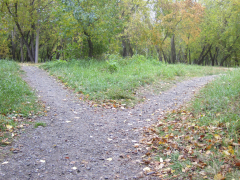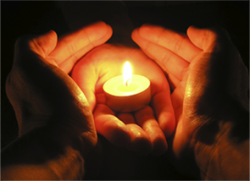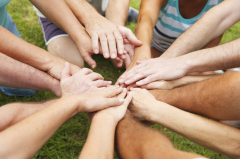Every Day Election Day: Seeing Our Choices More Clearly *
“In the market, the blind cry out to the one-eyed as clear-sighted.” (Genesis Rabbah 30:9)
 These are words from a scholarly dispute about Genesis 6:9, which declares that “Noah was a righteous man, unblemished in his generations." Rabbi Yehudah interprets this statement as veiled condemnation — in other words, Noah could only be considered righteous and unblemished when compared with the majority of his time. In a period of utter moral blindness, the “one-eyed” Noah was the greatest hope for both humanity and the earth.
These are words from a scholarly dispute about Genesis 6:9, which declares that “Noah was a righteous man, unblemished in his generations." Rabbi Yehudah interprets this statement as veiled condemnation — in other words, Noah could only be considered righteous and unblemished when compared with the majority of his time. In a period of utter moral blindness, the “one-eyed” Noah was the greatest hope for both humanity and the earth.
Noah’s critics often focus on his apparent silence during his extended preparations for disaster — preparations which fulfill the letter of divine command, but do not reflect any active concern for those beyond his immediate family. To pursue this line of ethical reasoning, it might be helpful to have our own moral “eyes” examined — and bring the focus back to ourselves.
Are our own choices really so different from those of Noah? Faced with multiple environmental, economic, and political disasters in a violent world today, most of us feel overwhelmed by the scope of suffering and turmoil around us. Although any number of worthy requests for our civic participation and support may cry out to us “in the market,” we remain blind to most of them — concentrating our energies on those efforts that we believe will bring greater security and comfort to our own immediate circles of family and friends.
Beyond that, we tend to commiserate privately, with extended analyses of what we think “they” should be doing. This is especially true as national elections approach. Beyond the calls for voting and its protection, a much wider and deeper range of day-to-day choices face us as citizens of a troubled world.
In Pirkei Avot 1:17, Shimon ben Gamaliel warns against substituting talk for action, and offers the provocative comment that “all who proliferate words bring sin.” Similarly, in the prophetic reading for Yom Kippur morning, Isaiah (58:9) counsels us to remove from our midst not only oppression, but finger-pointing (sh’lah etzba) — the process of deflecting responsibility away from ourselves.
 What might our communities and our world look like if we spend less time talking about circumstances beyond our control, and more time translating our concerns into practical, daily actions that we ourselves could take to make things better?
What might our communities and our world look like if we spend less time talking about circumstances beyond our control, and more time translating our concerns into practical, daily actions that we ourselves could take to make things better?
Faced with this challenge, we might find ourselves feeling greater compassion for Noah, who “elected” to concentrate his efforts on private solutions rather than risk the inconvenient, often frustrating, and sometimes contentious path of citizen action. But we might also take tentative steps toward a more manageable and satisfying integration (or re-integration) of citizen action into our own lives.
A classic blessing from the High Holy Day prayerbook Gates of Repentance offers vital support for this vision: "Cause us to see clearly that the well-being of our nation is in the hands of all its citizens."
I spent the night of the 2004 presidential elections as a volunteer in a local synagogue-based shelter for homeless women. As I watched the election returns together with our shelter guests, it was clear to me how little their lives were likely to be changed by the victory of either presidential candidate.
 Even so, I knew that I was bearing witness to a fundamental issue in a way that, however incremental and small, was part of a real solution. Simply by sleeping on a basement cot for one or two nights a year, I became an essential part of a greater support network — one that works toward broader policy change, at the same time as it provides individual homeless people with a decent night’s sleep and a better chance of moving into permanent housing.
Even so, I knew that I was bearing witness to a fundamental issue in a way that, however incremental and small, was part of a real solution. Simply by sleeping on a basement cot for one or two nights a year, I became an essential part of a greater support network — one that works toward broader policy change, at the same time as it provides individual homeless people with a decent night’s sleep and a better chance of moving into permanent housing.Seen clearly for what they are, our choices about how we spend both our time and our money can bring healing and transformation to our communities and our world, even if our vision as individuals is naturally limited.
"Cause us to see clearly that the well-being of our nation is in the hands of all its citizens." May we open our eyes to all of the possibilities — beyond finger-pointing — that make “Election Day” out of every day of our lives.
* An earlier version of this teaching was published by the Academy for Jewish Religion prior to the 2008 presidential elections.

